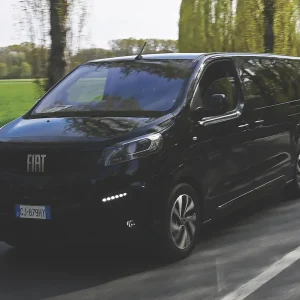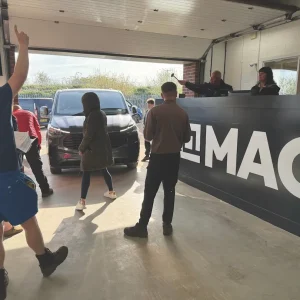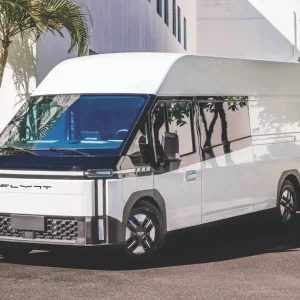Not so long ago received wisdom had it that no operator in their right mind would commit to buying a van without first having kicked its tyres and thoroughly inspected the metal.
But over the last decade the march of technology has meant that growing numbers of buyers now have the confidence to do business online.
BCA, which has been at the forefront of pioneering internet trading, reckons that about a quarter of sales now go to online bidders, and that figure heads towards 30% of a typical LCV sale.
The auction giant opened up sales to the internet 10 years ago and, according to marketing director Elaine Roberts, has seen a steady increase in online buying.
Roberts says some businesses only buy online, some combine internet trading with maintaining a presence in the halls while others use the internet to watch several sales at once, rather like financial traders monitor the stock exchange.
Rather than there being a distinct pattern, Roberts says it usually comes down to the company boss and “how IT savvy they are”.
Age and condition doesn’t seem to be an issue either, “provided vehicles are described accurately and transparently so that remote bidders feel they have all the information they need to make informed buying decisions,” comments BCA UK operations director Simon Henstock, who also advises that with the growth of online selling, pre-sale preparation becomes even more significant.
Roberts explains most LCV buyers have strict parameters of what they want before they bid online, if a dealer is looking for stock to put on a forecourt for example, they will only consider vehicles of up to three years old.
She adds that in BCA’s experience there is no difference in the type of stock vendors place online or send to an auction hall and says the firm operates a “hybrid model” where the auctioneer receives online bids as well as bids from the floor.
“We want buyers to have as much choice as possible and vendors to have as many buyers as possible,” says Roberts.
The National Association of Motor Auctions says that while up to a quarter of LCVs sell online this is dwarfed by the 90% figure for HGVs.
“We find buyers of vans still like to see the vehicle before they buy,” head of NAMA Louise Wallis says.
However, NAMA says buyers after specific vans will bid online whereas those after multiple vehicles tend to travel to auctions.
Again, Shoreham concurs. “A lot of online buyers are after specific vehicles we have and they don’t find it worthwhile to travel to see the vehicle before buying. However, buyers who are looking to purchase multiple vehicles usually make an effort to travel and will not buy online,” explains boss Alex Wright.
Wallis says specialist vehicles sell well online because buyers don’t have to tramp all over the country to find them and maintains there are few restrictions on what will sell via the web, though she warns: “A lack of transparency and information is what turns buyers off.”
BCA’s Henstock agrees. “Specialist vehicles such as tippers, dropsides and Lutons typically attract a big online audience of bidders due to their relative scarcity,” he says. “Condition is very important, however, as repairs on these vehicles can be expensive to carry out.”
Wallis urges buyers to embrace the online movement but advises them to deal with proven vendors and established auction houses. “These businesses will not run a mile when an issue arises,” she says. “A problem sorted will result in buyer loyalty.”
Roger Woodward, managing director of online remarketing company CD Auction Group, spells out why traders and operators have taken to internet shopping. “It gives buyers exposure to stock on a national scale, rather than relying on what has been dropped off at their local auction centre.”
CD Auctions runs fortnightly LCV sales of vehicles from operators such as ARI, Anglian Water and Vinci Fleet Services.
“A typical sale includes everything from car-derived vans through mainstream product such as Vivaro and Transit to tippers. I don’t think vendors need to view the online channel any differently – just faster and more efficient,” says Woodward.
He adds that providing high quality digital photography and a clear condition report of every product gives buyers the confidence to bid online and ensures vendors get a fair price for their stock.
BCA launched its Commercial Vehicle Video Appraisal service in 2013. It gives customers a 360-degree video of the vehicle’s interior, exterior, roof and loadbay condition and runs in HD format on PC, tablet and mobile devices. It also offers multiple still images with a zoom feature.
Roberts claims operators use it much as they would if they were at a physical auction. For example, they may hone in on the driver’s seat – if it is coffee stained they may conclude the previous owner has probably not looked after the engine. They may look at the sill at the rear to detect whether the van has been used to carry concrete, in which case the suspension may be damaged.
“They are confident enough to do it with Video Appraisal, it gives an indication of how its [the van] been looked after,” says Roberts.
Roberts anticipates in the future online remarketing will inevitably grow as the technology improves still further and younger generations who have grown up with the internet take over family businesses when their parents retire.
She also reckons more buyers will begin to use tablet or smartphone apps to bid online.
Although Roberts insists the “sold as seen” policy still applies at auction, she suggests the sort of insurance products emerging in the US to protect online buyers against unsuspected mechanical defects will start to catch on here.
But the key for buyers, she says, is to research a van’s history before entering a bid. “Who owned the van before? If it’s a large utility company you’ll know what it’s done. A buyer never wants to have something turn up they didn’t expect.”
Virtual value
Residual value specialist Cap says anecdotal evidence indicates the exponential growth in online sales has contributed to a rise in values.
Ken Brown, editor Cap Red Book LCVS, says logic suggests that because online buyers eliminate the expense involved in physically attending auction halls they can afford to pay more for the vehicles on their hit lists.
“We frequently see evidence of this as hall buyers storm off in disgust when beaten by internet buyers who bid well above what the hall buyers were willing to pay,” says Brown.
George Alexander, editor at Glass’s Guide, says online purchasing of LCVs has grown massively over the last four years.
“At first it was only the very best, late year stock that attracted online interest yet now there is cyber demand for LCVs of all types and at all years,” he says.
Alexander notes that during the corresponding period there has been consistent growth in LCV residual values due to the UK emerging from recession when there was a dire shortage of late-year stock.
“As demand for vans and pick-ups was running well ahead of supply it was inevitable that prices would soar,” he says.
Therefore he argues it is difficult to gauge how much of this improvement could be attributed to the growth in online demand.
What online remarketing has done, in Alexander’s opinion, is to enable trade buyers to bid for the stock at multiple venues around the country on the same day without needing to leave the office. This helps to promote price stability nationwide as similar vehicles are competing against each other nationally.
He says buyers are adopting sophisticated tactics to exploit online channels.
“They often employ knowledgeable individuals who travel to each auction sale and provide a detailed assessment of each lot of interest. This ensures online bids can be made with confidence and removes the need to bid low in order to cover the cost of attending to undisclosed faults.”
After a slow start online bidding is having a major impact on LCV remarketing.
However, many buyers still like to see and hear the vans they are bidding for so it seems likely the two channels will operate side by side – ensuring each van is presented to the greatest number of potential buyers.





